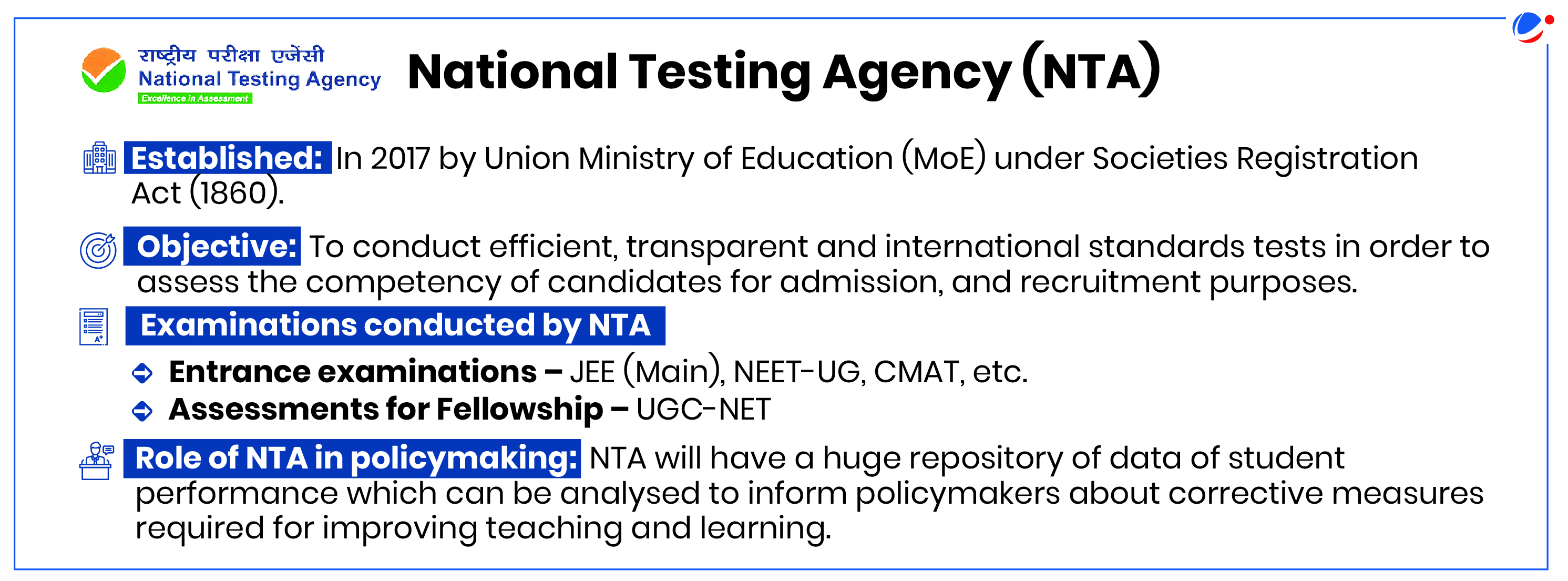Why in the News?
Recent controversy surrounding NEET UG and UGC NET examinations conducted by National Testing Agency (NTA) raised serious concerns surrounding failure of public examinations among students and academic circles.
More on News
- Controversy began over an alleged paper leak case during the conduct of the NEET UG exam on May 5, 2024, and a consequent outrage over "inflation of marks" of 1,563 students who were compensated for loss of time.
- Later, on June 19, Union Education Ministry, ordered the cancellation of the UGC-NET 2024 following inputs that the exam's integrity may have been compromised.
- In this backdrop, Union Education Ministry also constituted a high-level committee of experts led by former ISRO Chairman Dr. K Radhakrishnan to reform NTA.

Reasons for Failing Examination Systems in India
- Systemic: Shift to a single national-level exam, such as NEET for medical admissions, which doesn't account for local educational contexts, raises concerns about equitable assessment.
- Political influence in examination conducting agencies through appointments to key positions, lack of autonomy, etc., result in compromised decision-making and potential manipulation of exam processes.
- Policy instability including frequent changes in exam patterns or eligibility criteria which creates confusion and stress for students. E.g., Introduction and subsequent removal of upper age limits for NEET.
- There have been cases of high-level corruption in exam boards, including allegations of bribery for leaking papers or manipulating results. E.g., Vyapam scam in Madhya Pradesh.
- Cultural: In some parts of India, there's a degree of social acceptance of cheating in exams, often viewed as a way to overcome systemic disadvantages. E.g., Incidents of mass cheating reported from Bihar.
- High-stakes exams are often seen as life-changing events, leading some to justify cheating as a means to an end with active participation of Parents and relatives.
- Technological: Advancements in technology such as use of Bluetooth devices and Smartwatches, have made sophisticated cheating methods more accessible.
- Inadequate cyber security measures including lack of effective encryption or secure transmission methods for digital question papers exposes digital copies of question papers to unauthorized access.
Potential Implications of failure of Public Examinations
- Social: Repeated leaks and cancellations of examinations can result in erosion of public trust and widespread skepticism about the exam's fairness.
- Widening social inequalities as disadvantaged students suffer more from disruptions, exacerbating existing social disparities.
- Mental health issues among students and parents as uncertainty and rescheduling can cause significant anxiety.
- Shift in social values as repeated scandals may normalize cheating, affecting societal ethics.
- Economic: Direct financial losses due to conduct of re-examinations incur significant costs for the government and examination-conducting bodies.
- Potential brain drain due to loss of faith in domestic exams which may drive more students to seek education abroad, leading to economic losses.
- Political: Exam scandals can lead to hasty policy changes driven by political pressures rather than educational needs.
- Issues with national-level public examinations can exacerbate federal tensions between central and state governments. E.g., Disagreements between Centre and States over the implementation of NEET.
- Mishandling and failure of public examinations can affect the public's perception of government efficiency.
- Institutional: Deterioration of professional standards due to failure of examinations to properly assess candidates resulting in less qualified individuals entering the professional fields.
- Perpetuation of cycle of mediocrity: When incompetent professionals become future educators or evaluators, they perpetuate cycle of poor quality education and assessment.
- Burden of training on employers and professional bodies as they may need to invest more in training to bridge the competency gap.
Public Examination (Prevention of Unfair Means) Act, 2024
|
Way Forward
- Improving exam design: Emphasize more on assessing critical thinking and application skills rather than rote learning by introducing diverse question formats and practical assessments.
- e.g., Incorporating project-based assessments in admission to higher educational institutions.
- Security measures: Formulation and implementation of stricter protocols for handling and distribution of question papers by examination-conducting bodies.
- It can include measures such as real-time monitoring of exam-centres, use of encrypted digital lockers to storing question papers, etc.
- Institutional reforms: Establish independent statutory body for overseeing public examinations to reduce political interference in examination boards and testing agencies.
- Decentralization and customization: Allow more state-level input in national exams and introduce adaptive testing to address regional disparities and better assess individuals.





